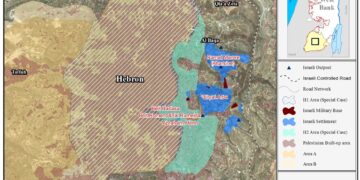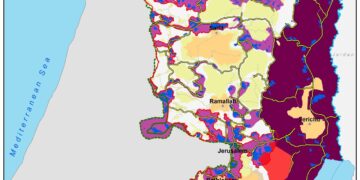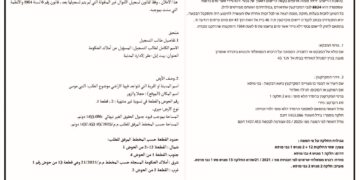Executive summary
This report is a product of two-months fieldwork from July to September 2019. It was conducted as an independent research project in collaboration between Lund University and ARIJ (Applied Research Institute – Jerusalem). The views expressed in this report are the author´s own and do not necessarily reflect Lund University and ARIJ´s stance.
The applied methodology is based on interviews and participant observation. The report conducted several field visits to Palestinian Bedouin communities in the West Bank, one unrecognized village in the Negev and the Arab Bedouin townships of Tel Sheva and Houra. Due to natural limitations in the research, the interviews conducted in the West Bank were concentrated in Jerusalem and Hebron districts. Interviews also extended to human rights activists concerned with Bedouin rights. The report is also based on secondary research on published literature on Arab Bedouins and NGO reports. Due to the sensitivity of the issue, all sources were assured complete anonymity to protect their identity.
From the several conducted interviews, this report chooses the Jahalin tribe in the Khan al-Ahmar village as a pivotal turning point for the direction of this report. The change in scope arose from an interview conducted on the 24th August 2019, a few days after the Khan al-Ahmar road connected to the Jericho-Jerusalem highway was closed by a gate declaring it a firing military zone without informing the Khan al-Ahmar residents or demonstrating proof of an official military order. The interview was also conducted days after two residents were arrested for attempting to trespass the area. No fine or legal action was taken due to the ‘novelty’ of the gate and sign. The gate´s sign is displayed on the report´s cover.
The concerning strategy that the fieldwork debates was offering to the E1-located Bedouins, in specific one usra (family), the much-desired Palestinian right of return. This is a controversial offer, feasibly rumours and an empty promise, as the state of Israel has constantly rejected the Palestinian right of return since the 1948 Nakbah. But nonetheless, rumours, if planted well in people´s minds, are equally damaging, especially within a divisive conflict. However, choosing to discuss this issue is means as to discuss the Bedouin experience of displacement and relocation, and the stressing proposal process they are subjected to. The puzzled interviewed Bedouin declared that the proposal had come straight from the Prime Minister´s office. Why would the Israeli government be willing to return this specific usra and possibly, ashira (clan) back to their ancestral lands of the Negev?
Though at first glance the offer of return seems a bold move, this report argues it is a logical next step after the 2018 international backlash against the attempted demolition and eviction of Khan al-Ahmar. Ben-Gurion once said that the transfer of Palestinians, conceivably an ethnic cleansing, should be practical and necessary. This report argues that returning the E1 Bedouins to the Negev, where they will face even more spatial control, is practical and necessary for the Judaization process of Greater Jerusalem. Therefore, this report sees the annexation of E1 as another crucial puzzle piece in the advancement of the settler enterprise and the engineering of an Israeli 70:30 demographic balance strategy for a Jewish majority.
Accordingly, this report uses a speculative approach regarding the possible new Israeli strategy of displacement towards the Khan al-Ahmar Bedouins. Thus, this report denounces the proposed right of return to Khan al-Ahmar Bedouins as another displacement strategy against Palestinian Bedouins and therefore, should be denounced as strategic réfoulement. Réfouler from French means expel and international law states that no person should be forced into a country where they will face discrimination and persecution. Allowing the Khan al-Ahmar Bedouins to go back to the Negev, not only will be strategic refoulement, but it also fits perfectly within the Israeli narrative of ´voluntary transfer´. It is, hence, in line with Israel´s patterned expropriation procedures.
The analysis concludes that if Bedouins from the relocation E1 plan accept the proposal of the right of return, their lives could be endangered by:
- Israeli government´s ´divide and rule´ strategy which would entail exposing the Arab Bedouins at high risk of being accused of Israeli collaborators as other Palestinian refugees would have not been offered an equal right of return.
- The ostracization of an already marginalized community and the likely recrimination by the Palestinian Authority and Palestinian public opinion selling Palestine´s future state.
- Uncertain security. If the E1 Bedouins are allowed to return to the Negev, what would the conditions of their relocation entail? This report guarantees the relocation plan will not entail giving the Bedouins an agricultural plot of land but most likely, the Khan al-Ahmar Bedouins will be forced into unsustainable villagization in one of the failed townships of the Negev designated exclusively for Bedouins.
To address this last point, this report uses a comparative approach to the conditions lived by the Arab Bedouins of the Negev, whether located in recognized or recognized villages, it will showcase the peril and insecurity of the Right of Return. Bedouins in the Negev are citizens of Israel, yet they live in unsustainable conditions of discrimination, harassment, lack of basic services, lack of opportunities, and the threat of demolition. According to the Israeli Central Bureau of Statistics, the Negev Bedouins are the poorest and most marginalized community in Israel, and, therefore, a voiceless subaltern identity.
Ultimately, the vulnerability of Arab Palestinian Bedouins is at the heart of this report. As a subaltern identity, this report wishes to recommend paths of inclusion and humanitarian support. Most importantly though, the strengthening of effective leadership and strategic vision between Bedouin communities and their relations with the Palestinian Authority.
As a final note, this author cannot assure if the right of return offer is false or a viable possibility for the Khan al-Ahmar Bedouins. What this report can assure is that the proposal is detrimental to the Palestinian community as a whole for the viability of a two-state solution. Primarily, the report has focused on the social impact of the Israeli relocations proposals. The spread of the Negev return proposal, whether honest or hearsay, can have a decisive impact on the peace negotiations and the Palestinian negotiation team. Due to the sensibility of the topic and source of information, this report is not intended for public distribution, but to inform both ARIJ´s POICA and Urbanization Monitoring Department and press the department to confirm or deny its legitimacy. Even if the rumor is unfounded, an investigation looking into its ramifications will be critical to ascertain its effects on the ground.
To read full report, click here
Prepared by:
The Applied Research Institute – Jerusalem













